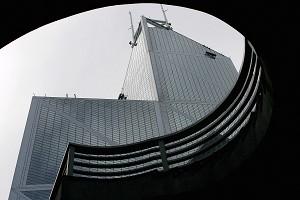On May 18th, 2006, Bank of China launched its $9.9 billion Initial Public Offering (IPO) in the Hong Kong Stock Market. However, according to some Chinese economic experts, it indicates the collapsing of China’s financial system. The bank hopes to overcome the crisis by raising capital overseas.
Bank of China plans to sell about 25.5 billion shares globally at a price between HK$ 2.5 and 3 (approximately US$ 32 cents to 39 cents) which will raise about $9.9 billion. Only five percent of the 25.5 billion shares or 1.278 billion shares will be sold in Hong Kong.
Bank of China is the largest bank among the four Chinese state-owned banks. Following the China Construction Bank and Bank of Communications, Bank of China is the third state-owned bank to raise funds at the Hong Kong stock market. During recent years, many scandals were exposed at Bank of China, including the dismissal of its presidents, Wang Xuebin and Liu Jinbao, for accepting huge bribes. Bank of China also has a large amount of debt, and has suffered a loss of state-owned properties. Experts suspect that the bank is already insolvent and close to bankruptcy.
China expert and executive editor of Hong Kong Open Magazine, Ms. Cai Yongmei, stated that the Chinese state-owned banks wish to overcome the crisis by raising funds from overseas markets. She said, “These banks should have been bankrupt already if the Chinese government did not support them. In China, many economic transactions are dictated by the government and these banks are kept operating with people’s money. Though these banks are still operating in China, they are very risky. The purpose of IPO in the Hong Kong stock market is to transfer the risk to overseas markets.”
Ms. Cai said, “I believe that the Chinese government’s crisis will start from financial fields.” She said that IPO on overseas stock markets is not risk-free for the Chinese Communist Party (CCP) either, “Now that you are part of the international financial system, the banks will lose their ground as soon as there is any financial issue in the market. This may drag down not only the banks, but also the CCP government.”
However, Bank of China Chairman Xiao Gang claims that the bank is performing well and has a prosperous financial future. Ms. Cai does not agree with Xiao. She contends that any numbers from the CCP are not reliable. The CCP does not offer any assurance to the investors at all. “We all know how capable the CCP can be when creating false numbers. Its statistics are so unique that no one believes their numbers. The bank’s data for the IPO are not reliable; owning such stocks in the long run could be very risky.”
Ms. Cai reminds investors that they may profit in the short term, but long term risk is very high. She said, “Many Chinese state-owned enterprises traded on the Hong Kong market are problematic. Their financial reports are fabricated and could not pass an audit. Because they are state-owned, people who bought their shares believe that the Chinese government will support them. As matter of fact, many of my friends lost their money investing in Chinese state-owned companies.”
Ms. Cai pointed out that because of the conspiracy between the banks and the Chinese regime, Chinese banks continue to have scandals, including Bank of China. A perfect example was the case of Wang Xuebin, former president of Bank of China. Wang turned huge amounts of state-owned properties into his personal properties. When the scandal was exposed, he was simply transferred to Construction Bank of China with no criminal charges. Many participants of Wang Xuebin’s case who embezzled millions in state-owned properties, including Taiwan movie star Liu Jiaxing, are still doing business in China.
Ms. Cai said, “These people turned state-owned properties into their personal properties. But none of them was charged. This is an issue of supervision and monitoring.” Ms. Cai mentioned another classic case. Liu Jinbao, President of the Hong Kong branch of Bank of China, “illegally lent enormous amounts of funds to state-owned enterprises. These funds were never paid back.” Hong Kong media reported that the typical way for Bank of China to deal with this kind of bad debt of state-owned Chinese companies was to write it off. There are many such cases.




